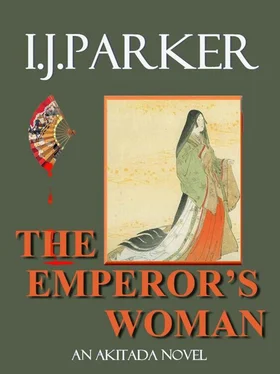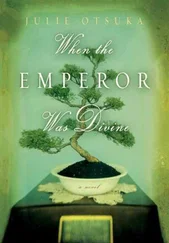I. Parker - The Emperor's woman
Здесь есть возможность читать онлайн «I. Parker - The Emperor's woman» весь текст электронной книги совершенно бесплатно (целиком полную версию без сокращений). В некоторых случаях можно слушать аудио, скачать через торрент в формате fb2 и присутствует краткое содержание. Жанр: Исторический детектив, на английском языке. Описание произведения, (предисловие) а так же отзывы посетителей доступны на портале библиотеки ЛибКат.
- Название:The Emperor's woman
- Автор:
- Жанр:
- Год:неизвестен
- ISBN:нет данных
- Рейтинг книги:5 / 5. Голосов: 1
-
Избранное:Добавить в избранное
- Отзывы:
-
Ваша оценка:
- 100
- 1
- 2
- 3
- 4
- 5
The Emperor's woman: краткое содержание, описание и аннотация
Предлагаем к чтению аннотацию, описание, краткое содержание или предисловие (зависит от того, что написал сам автор книги «The Emperor's woman»). Если вы не нашли необходимую информацию о книге — напишите в комментариях, мы постараемся отыскать её.
The Emperor's woman — читать онлайн бесплатно полную книгу (весь текст) целиком
Ниже представлен текст книги, разбитый по страницам. Система сохранения места последней прочитанной страницы, позволяет с удобством читать онлайн бесплатно книгу «The Emperor's woman», без необходимости каждый раз заново искать на чём Вы остановились. Поставьте закладку, и сможете в любой момент перейти на страницу, на которой закончили чтение.
Интервал:
Закладка:
“Yes. I was trying to account for what she had done.”
“The poem is dated months earlier, at a time when she was distraught over her father’s anger. In other words, there never was any indication that Lady Masako intended to die that night at the villa, was there?”
“Oh.” Atsuhira wept. “No, there wasn’t. Oh, what a relief! Thank you. Thank you for telling me. I have been in agony. I blamed myself.”
Akitada said coldly, “As to that, you will know best what your responsibility was in seducing a young and inexperienced girl who was one of the emperor’s women. Your behavior is inexcusable in my eyes. I had to intercede once before when one of your careless affairs nearly precipitated another succession scandal. Your uncle, the late Bishop Sesshin, asked for my help on that occasion. I had hoped you had learned your lesson then.”
The prince dabbed at his eyes. “I see why you’re so angry at me,” he said. “But you must believe that I truly loved Masako. We couldn’t help ourselves. Our love was stronger than everything. I don’t want to be emperor, but the way my cousin treated Masako angered me. He didn’t deserve her.”
Akitada glared at him. “So you shared your feelings about His Majesty with Kosehira and involved him. I expect you to go to the regent to clear his name, apologize for your behavior, and ask his help in settling the matter of the succession once and for all. You may wish to take vows afterward. Nothing short of becoming a monk will convince people that you don’t want to be emperor.” Without waiting for a response, Akitada turned and walked out.
In the following weeks, life in the Sugawara family settled down. Saburo was once again installed as Akitada’s secretary. Genba and Ohiro moved into their new quarters in the stable, and Ohiro spent a good deal of her time in the kitchen where she attempted to teach Cook new ways to prepare foods. Cook had never been more than passable in her skills, and the household fare was uninspired. Now some very tasty dishes appeared. As a result of this interference, Cook departed in a huff to the secret joy of the members of the household. Ohiro took over her duties.
Not long after this, his friend Kosehira returned to the capital, cleared of all suspicion and eager to celebrate with his friends and supporters. However, in spite of his contentment, Akitada felt restless.
One morning, Tora voiced the reason for Akitada’s dissatisfaction. “You know, sir,” he said, “two people have died violently and nobody got punished. It doesn’t seem right.”
Akitada nodded. “You’re right. It doesn’t. Not that we had any choice in the matter. Bashan, that slippery fellow, left no proof of what he’d done, and Lady Masako’s killer could not be revealed or arrested because it would have involved court matters. But it troubles me also.”
Bashan, or Satake Narimitsu as he was born, disappeared into the northern provinces, and nothing else was heard of him. But Morinaga’s fate became known soon after this conversation. The minister, Fujiwara Kaneie, conveyed the information to Akitada one morning.
“You recall the death of one of His Majesty’s ladies last winter?” he asked.
“Yes. She died of some illness, didn’t she?”
“Yes. A bit odd that. People have been saying she lost a child. The palace, of course, won’t confirm such rumors. However, it’s not the young woman who is being talked about but her brother.”
Akitada became alert. “Minamoto Maseie’s son?”
“Yes. It’s shocking. First the man loses his daughter before she can become a consort of the emperor, and then his only son dies. A hunting accident, apparently. It happened in Sagami, right after Maseie and Masanaga reached their home. Mind you, the young man had a poor reputation while he was here. The regent dismissed him from his post in the guard.” The minister shook his head. “Maseie’s karma must be very bad.”
Akitada nodded. He wondered how Maseie had managed his son’s death, but there would have been many opportunities. The father had avenged the daughter’s murder, but at what cost to himself?
For a moment, he lost himself in imagining the man’s pain and despair, uncomfortable with his own role in bringing it about. Yes, karma explained it very well. Maseie, as well as his children, must have earned these tragedies by having committed evil deeds in their past lives. One must accept one’s fate and strive to earn a better future.
Historical Note
The time of this novel is 1028 in the Heian period and predates the centuries of shoguns and samurai warriors. Though there certainly were wars and warriors, life was more peaceful and orderly than in later centuries. An emperor and a central government controlled the people from the capital city of Heian-Kyo (later Kyoto). Additional provincial administrations along with a well-organized transport system made for a mostly stable government. Most institutions and customs followed those in T’ang China, but the Japanese had long since broken off relations with that nation, and the meritocracy of the Chinese government had made place for promotion by rank and influence.
Control of the central government eventually passed into the hands of a single large family, the Fujiwara. Through marriage politics, senior Fujiwara officials held all the highest positions and controlled the emperor. They became the fathers-in-law, uncles, grandfathers, and cousins of ruling emperors. By encouraging the early abdication of emperors in order to replace them with more easily controlled children, they protected their power. Perhaps the most powerful man of the time was Fujiwara Michinaga, who ruled for many years, either as chancellor or as regent, being the father or grandfather of chancellors, empresses, and emperors. By 1028, he had died, but his power had passed to four of his sons
We know a great deal about life in the imperial palace. The court ladies of the time were avid writers and produced novels, diaries, and an abundance of poetry depicting their lives and those of the courtiers. Lady Murasaki’s Genji is the most important of these works. It describes the events in the life of an imperial prince who was also a famous lover. Then there are the diaries which deal with real events and real people at court and around the person of the emperor. Among these are Sei Shonagon’s sharp-tongued commentary, Lady Murasaki’s account of her service as lady-in-waiting to one of the young empresses, diaries of women like Izumi Shikibu, the Kagero Nikki, and the Sarashina Nikki. We learn from these not only about court observances, but also about the manners and mores practiced in this setting. Love affairs were common and fraught with grief for many of the women. Access to pretty young girls serving the emperor was apparently easy, and courtships/and affairs were pursued with alacrity by the gentlemen who served at court. The best and most accessible scholarly account of life at court may be found in The World of the Shining Prince by Ivan Morris.
With the administrative power almost exclusively in the hands of the Fujiwara family, whose daughters were usually empresses and consorts, emperors tried to rule briefly before resigning under pressure from their in-laws in favor of sons who were minor children and ascended the throne under the guardianship of a Fujiwara grandfather. Political uncertainties about the imperial succession could ensue when there were several claimants to the throne. Invariably, the choice of a crown prince was in the hands of his Fujiwara relatives but affected all the lives and careers of officials. Hence, in this novel, the seriousness of the alleged plot by Prince Atsuhira and the efforts of Minamoto Maseie to introduce his daughter Masako into the emperor’s bed.
Читать дальшеИнтервал:
Закладка:
Похожие книги на «The Emperor's woman»
Представляем Вашему вниманию похожие книги на «The Emperor's woman» списком для выбора. Мы отобрали схожую по названию и смыслу литературу в надежде предоставить читателям больше вариантов отыскать новые, интересные, ещё непрочитанные произведения.
Обсуждение, отзывы о книге «The Emperor's woman» и просто собственные мнения читателей. Оставьте ваши комментарии, напишите, что Вы думаете о произведении, его смысле или главных героях. Укажите что конкретно понравилось, а что нет, и почему Вы так считаете.












